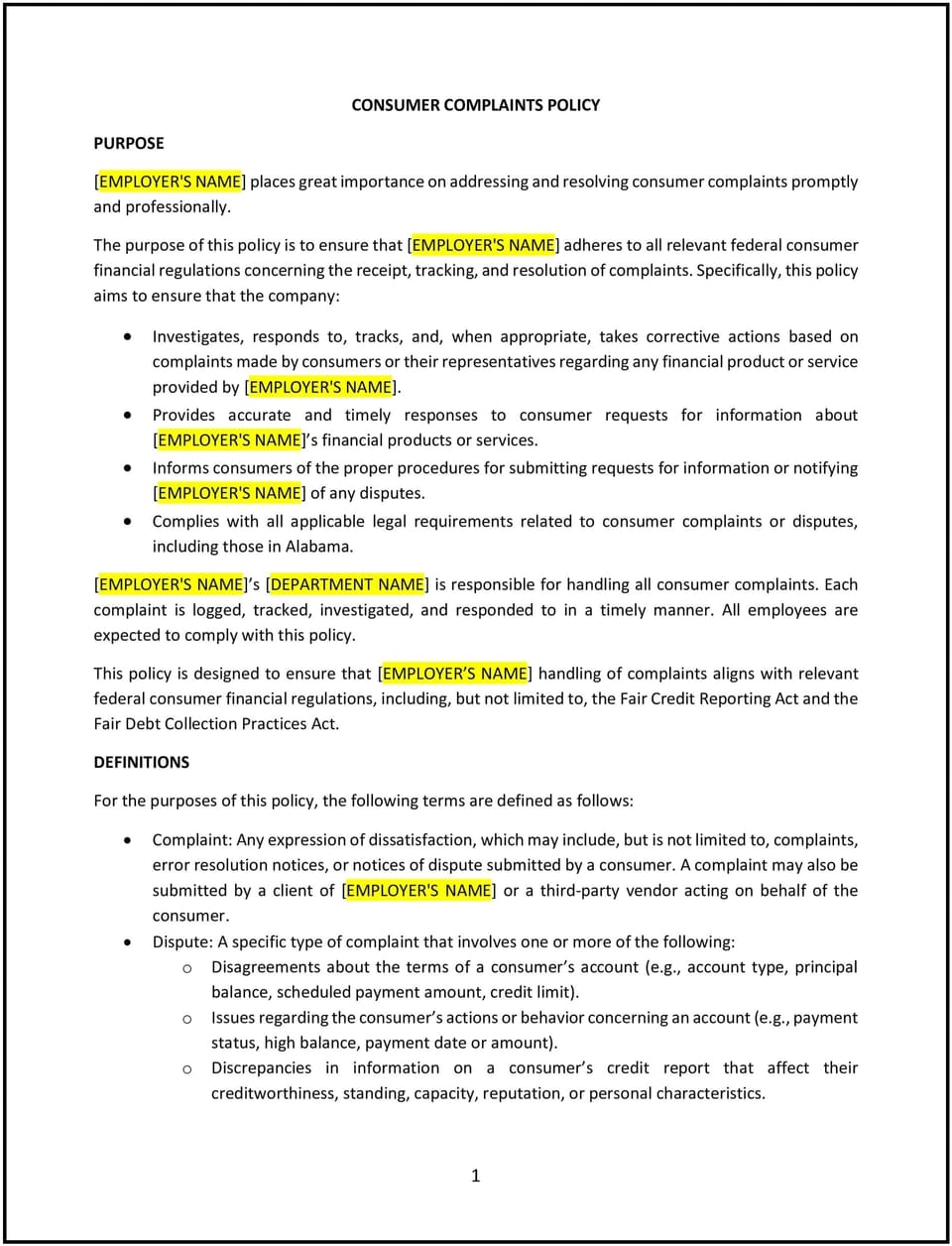Consumer complaints policy (Alabama): Free template

Consumer complaints policy (Alabama)
A consumer complaints policy provides clear guidelines for handling and resolving complaints from customers in a structured, professional manner. For SMBs in Alabama, this policy is essential to protect your reputation, build trust with your customers, and ensure compliance with state and federal consumer protection laws. By tailoring this policy to your business, you create a consistent framework for addressing customer concerns effectively and efficiently.
This policy also supports your business in identifying recurring issues, improving products or services, and enhancing the overall customer experience.
How to use this consumer complaints policy (Alabama)
- Define the scope: Clearly outline the types of complaints your business will address, such as product defects, service delays, or billing disputes.
- Provide a reporting process: Detail how customers can file complaints, whether through an online form, email, phone, or in person.
- Acknowledge complaints promptly: Set expectations for acknowledging complaints, such as responding within 48 hours to assure customers their concerns are being addressed.
- Outline resolution timelines: Include a clear process for investigating and resolving complaints, specifying how long customers should expect to wait for resolution.
- Train employees: Ensure your staff is equipped to handle complaints professionally and empathetically, following the outlined procedures.
Benefits of using a consumer complaints policy (Alabama)
A well-implemented consumer complaints policy strengthens your business and builds customer loyalty. Here's how it helps:
- Enhances customer trust: Demonstrates your commitment to resolving issues and maintaining high standards of service.
- Ensures consistency: Provides a structured approach to handling complaints, minimizing errors or delays.
- Supports compliance: Aligns with Alabama’s consumer protection laws and federal regulations, reducing the risk of legal disputes.
- Identifies areas for improvement: Helps you gather valuable feedback to refine products, services, or internal processes.
- Protects your reputation: Proactively resolving complaints minimizes negative reviews and strengthens your brand image.
Tips for implementing a consumer complaints policy (Alabama)
- Encourage multiple reporting channels: Provide customers with convenient ways to file complaints, such as a dedicated email address, customer service hotline, or online portal.
- Document complaints thoroughly: Maintain detailed records of complaints, including the nature of the issue, steps taken, and the final resolution. This documentation helps identify trends and supports legal compliance.
- Address Alabama-specific concerns: Tailor your policy to industries common in Alabama, such as retail, hospitality, or healthcare, and ensure adherence to local consumer laws.
- Communicate resolutions clearly: Provide customers with a clear explanation of the steps taken to resolve their complaint and any follow-up actions.
- Review and update regularly: Periodically assess the effectiveness of your complaints policy and make improvements based on customer feedback and changes in regulations.
Q: Why does my business need a consumer complaints policy?
A: A policy ensures complaints are handled consistently and professionally, protecting your reputation and maintaining customer satisfaction.
Q: What are the legal requirements for handling complaints in Alabama?
A: While Alabama does not mandate a specific complaints process, adhering to federal consumer protection laws, such as the Federal Trade Commission (FTC) regulations, is essential.
Q: How quickly should complaints be resolved?
A: It depends on the complexity of the issue, but aim for a resolution within 7–10 business days. Include clear timelines in your policy to manage customer expectations.
Q: Can this policy help prevent negative reviews?
A: Yes, addressing complaints promptly and effectively reduces the likelihood of customers sharing negative feedback publicly.
Q: Should complaints be escalated to management?
A: Yes, if a complaint cannot be resolved at the staff level, having a process for escalation ensures that serious concerns are addressed appropriately.
Q: How can this policy improve customer retention?
A: By addressing concerns effectively, you build trust and loyalty, showing customers that their satisfaction is a priority.
This article contains general legal information and does not contain legal advice. Cobrief is not a law firm or a substitute for an attorney or law firm. The law is complex and changes often. For legal advice, please ask a lawyer.


